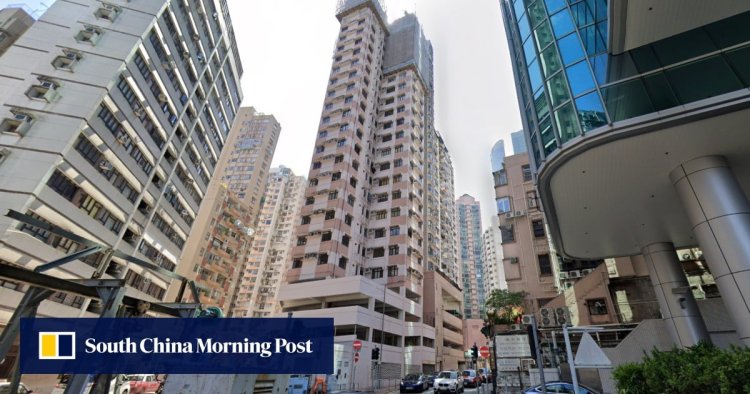Case of Hong Kong woman, 75, stranded in flat after carer brother died highlights need to help ageing people looking after elderly, experts say
2023.06.15 09:00Concern groups have said the case of a 75-year-old bedridden cancer patient left alone for as long as six days after her younger brother died in their Hong Kong flat highlighted the risks of elderly people being looked after by ageing carers.The experts on Wednesday also said the incident in Happy Valley, a middle-class area, reflected the need for appropriate healthcare across the income spectrum as the city’s population of older people increased.“This case in Happy Valley has exactly pointed out that everyone should receive holistic, continuous care,” said Dr Donald Li Kwok-tung, the chairman of the government-appointed Elderly Commission. “Don’t think better-off people don’t need that.”He was speaking after a social worker on a weekly visit to the flat at Paramount Mansion on Shan Kwong Road alerted authorities after she failed to get an answer at the door on Tuesday.Firefighters broke into the flat and found the weak and dehydrated woman in her bed and her brother,


Concern groups have said the case of a 75-year-old bedridden cancer patient left alone for as long as six days after her younger brother died in their Hong Kong flat highlighted the risks of elderly people being looked after by ageing carers.
The experts on Wednesday also said the incident in Happy Valley, a middle-class area, reflected the need for appropriate healthcare across the income spectrum as the city’s population of older people increased.
“This case in Happy Valley has exactly pointed out that everyone should receive holistic, continuous care,” said Dr Donald Li Kwok-tung, the chairman of the government-appointed Elderly Commission. “Don’t think better-off people don’t need that.”
He was speaking after a social worker on a weekly visit to the flat at Paramount Mansion on Shan Kwong Road alerted authorities after she failed to get an answer at the door on Tuesday.
Firefighters broke into the flat and found the weak and dehydrated woman in her bed and her brother, 71, dead in the bathroom.
An insider familiar with the case said the woman could have been deprived of food and fluids for almost a week, based on newspapers from last Thursday found in the flat.
Happy Valley was one of the earliest-developed, upper-income residential areas on Hong Kong Island and is known as the home of many celebrities because of its relative seclusion.
Linda Lam Chiu-wa, a clinical psychogeriatrics professor at Chinese University, said the case indicated that problems faced by the elderly were “not entirely related to their socio-economic status”.
“Up the social ladder, they are faced with different issues,” she said. “Even though some people are financially capable, they don’t have the preparation for their health plans.”
She added the case also revealed a problem of the elderly’s lack of willingness to accept help, such as going into nursing homes.
“Chinese culture suggests that elderly homes are not good,” she said. “People also have biased perceptions towards institutional care.”
Bedridden woman, 75, found alone in Hong Kong flat with brother’s body
A report published by Polytechnic University last year found that, although most economies have national or regional policies for carers, accessing help, particularly financial assistance, was often difficult.
“Although most economies provide direct financial assistance for carers, the eligibility criteria for application are varied and complicated, and the application process is time-consuming,” the report said.
“Applicants often need to cooperate with the income test and give up or reduce their jobs, creating obstacles for carers when applying for financial assistance.
“Although many organisations in Hong Kong have emergency hotline services in place, few carers are aware of these services and do not know these services are available to them.”
The Senior Citizen Home Safety Association at present provides round-the-clock Care-On-Call services to those in need with a click on a device to connect to a personal emergency link.
Crystal Yuen Shuk-yan, a community organiser with welfare group Society for Community Organisation, said Hong Kong lacked carer-centred policies to provide auxiliary services in case of emergencies.
“We have spoken to many families and they have said they are in desperate need of 24-hour services,” she said. “Those elderly two-person families have told us they need nighttime care services in particular.”
Skeleton found at Hong Kong flat in second case of remains discovered in 2 days
Yuen said she had come across a woman aged more than 70 who looked after her 90-year-old mother.
“In some cases, the carers’ situation could even be worse than the care receivers,” she said. “We have also seen some middle-class families having spent all their savings and the only thing left they could rely on was their flat.”
The Social Welfare Department said it would introduce measures to boost support for carers to the elderly and people with disabilities from the third quarter of the year.
Plans include an increase in the number of respite service places, optimising the inquiry system and a special support hotline for carers.
The hotline would be answered by professional social workers and offer immediate consultation services, emotional support and referral services, a department spokesman said.
“The Social Welfare Department will also implement a three-year citywide publicity plan to promote a series of publicity and public education on carer support,” he added.
Government estimates have shown that Hong Kong could become a super-aged society this year, where people 65 and above accounted for more than a fifth of the total population of 7.4 million.
The proportion of the elderly population is expected to rise to 30 per cent by 2036.
What's Your Reaction?

















